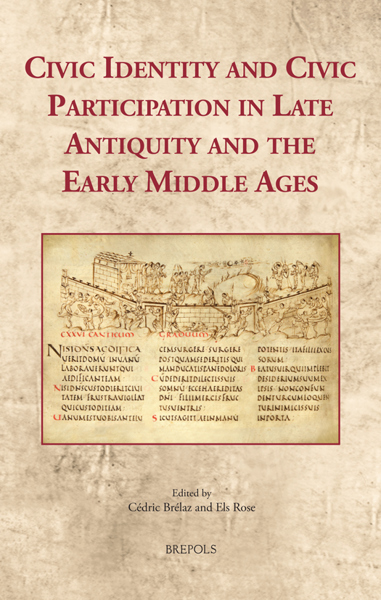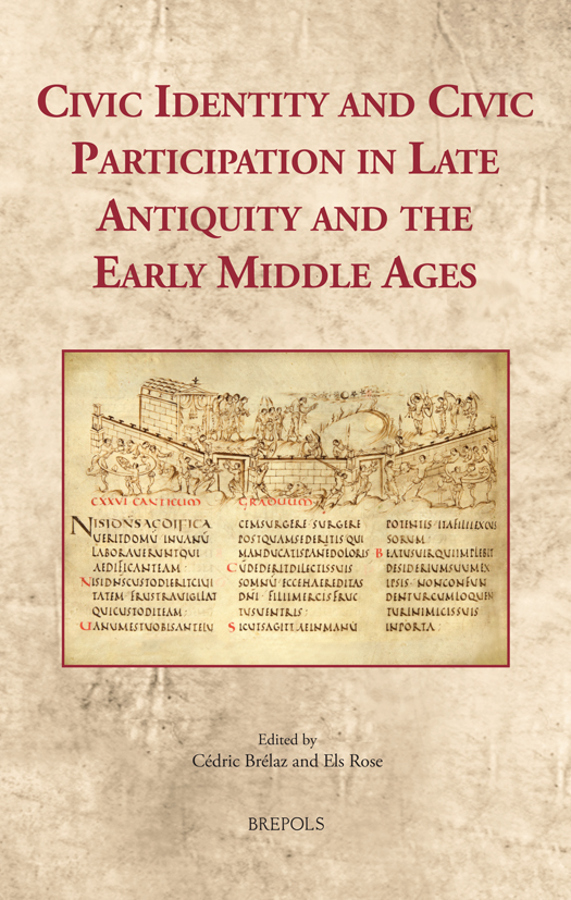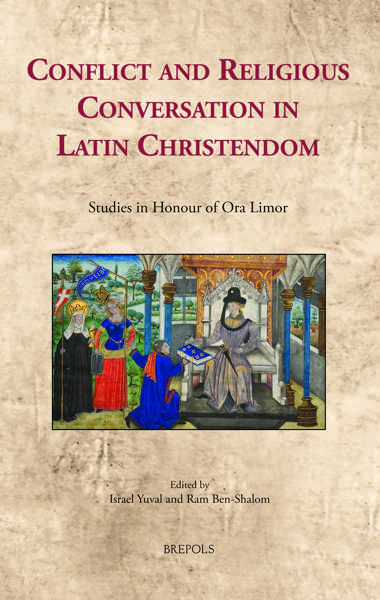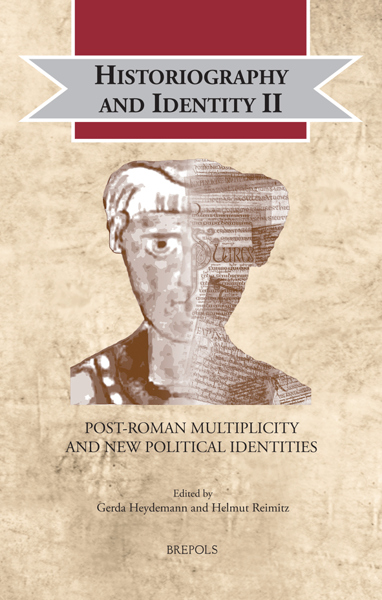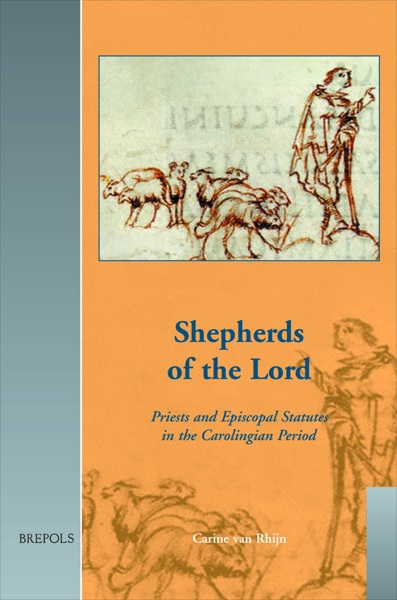
Civic Identity and Civic Participation in Late Antiquity and the Early Middle Ages
Cédric Brélaz, Els Rose (eds)
- Pages: 447 p.
- Size:156 x 234 mm
- Illustrations:6 b/w, 3 tables b/w., 1 maps b/w
- Language(s):English
- Publication Year:2022
- € 120,00 EXCL. VAT RETAIL PRICE
- ISBN: 978-2-503-59010-3
- Hardback
- Available
- ISBN: 978-2-503-59011-0
- E-book
- Available
Studies the continuities and discontinuities in the functioning of civic bodies in the late and post-Roman world.
“The editors must be congratulated for producing a lengthy volume that manages to balance on the one hand a considerable breadth in its geographical and chronological coverage, and on the other a set of consistent themes that unify its contents. (…) The result is a stimulating, multifaceted reflection of urbanism during a transformative era, in which new and diverse forms and expressions of vertical and horizontal relationships alike redefined communal life for city-dwellers across the Mediterranean World.” (Gregory I. Halfond, in Bryn Mawr Classical Review, 2023.04.09)
“This is an important book that returns to a number of questions fundamental to the history of civic identity, which Cédric Brélaz and Els Rose set out clearly in the introduction (…) The quality of the volume lies in the fact that the contributors have responded in a precise, detailed, and sometimes “microscopic” manner, as Claudia Rapp rightly says in her afterword, by calling on a large number of sources, historiographical, epigraphic, legal, and jurisprudential.” (Claudia Moatti, in The Medieval Review, 02/06/2023)
“(…) this is a volume bringing together a wide variety of perspectives into a useful whole.” (Stephen Joyce, in Parergon, 40/1, 2023, p. 240)
“This work is an excellent collection of essays examining the concept of “citizenship” in the
towns of the Roman Empire during its later stages—the period of Late Antiquity, the sub-Roman period, the Byzantine East, and medieval towns.” (Jill Mitchell, in Church History, 2023, p. 696)
« Pour aborder ce sujet, les responsables ont fourni un travail collectif qui se caractérise par un niveau d’érudition élevé, comme le prouvent les notes de bas de page, les bibliographies et les références à des sources très variées. » (Yann Le Bohec, dans Le Moyen Âge, 129/2, 2023, p. 533)
"(...) all contributions focus on at least one of the two concepts in issue, making this a relatively coherent volume. They are also all interesting pieces in their own right. For these two reasons the volume will be useful for scholars of political, religious, and urban history." (Thomas Langley, in Journal of Late Antiquity, 17(2), 2024, p. 567)
Cédric Brélaz is Professor of Ancient History at the University of Fribourg, Switzerland.
Els Rose is Professor of Late and Medieval Latin at Utrecht University.
During the Ancient Greek and Roman eras, participation in political communities at the local level, and assertion of belonging to these communities, were among the fundamental principles and values on which societies would rely. For that reason, citizenship and democracy are generally considered as concepts typical of the political experience of Classical Antiquity. These concepts of citizenship and democracy are often seen as inconsistent with the political, social, and ideological context of the late and post-Roman world. As a result, scholarship has largely overlooked participation in local political communities when it comes to the period between the disintegration of the Classical model of local citizenship in the later Roman Empire and the emergence of ‘pre-communal’ entities in Northern Italy from the ninth century onwards.
By reassessing the period c. 300-1000 CE through the concepts of civic identity and civic participation, this volume will reassess both the impact of Classical heritage with regard to civic identities in the political experiences of the late and post-Roman world, and the rephrasing of new forms of social and political partnership according to ethnic or religious criteria in the early Middle Ages. Starting from the earlier imperial background, the fourteen chapters examine the ways in which people shared identity and gave shape to their communal life, as well as the role played by the people in local government in the later Roman Empire, the Germanic kingdoms, Byzantium, the early Islamic world, and the early medieval West. By focusing on the post-Classical, late antique, and early medieval periods, this volume intends to be an innovative contribution to the general history of citizenship and democracy.
Introduction — CÉDRIC BRÉLAZ, ELS ROSE
Part I. Local Communities, Citizenship, and Civic Participation in the Early Roman Empire (1st-3rd Century CE)
Local Citizenship and Civic Participation in the Western Provinces of the Roman Empire — CLIFFORD ANDO
Democracy, Citizenship(s), and ‘Patriotism’: Civic Practices and Discourses in the Greek Cities under Roman Rule — CÉDRIC BRÉLAZ
Part II. Local Identities, Civic Government, and Popular Participation in Late Antiquity
Civic Identity and Civic Participation in Constantinople — ANTHONY KALDELLIS
Social Status and Civic Participation in Early Byzantine Cities — AVSHALOM LANIADO
Informal Expressions of Popular Will in Late Roman Africa — JULIO CESAR MAGALHÃES DE OLIVEIRA
Urban Identities in Late Roman Italy — PIERFRANCESCO PORENA
Cities and Civic Identities in Late Roman and Visigothic Spain — MICHAEL KULIKOWSKI
Part III. Rephrasing Citizenship
Personal Identity in the Later Roman Empire — RALPH MATHISEN
A Relationship of Justice: Becoming the People in Late Antiquity — PETER VAN NUFFELEN
Reconfiguring Civic Identity and Civic Participation in a Christianizing World: The Case of Sixth-Century Arles — ELS ROSE
Legalizing Ethnicity: The Remaking of Citizenship in Post-Roman Gaul (6th-7th Centuries) — STEFAN ESDERS AND HELMUT REIMITZ
Part IV. Expressions of Civic Identity in the Early Middle Ages
Urban Populations in Early Islam: Self-Identification and Collective Representation — MATHIEU TILLIER
Urban Culture in the Early Medieval West: The Case of the Episcopal Towns in the German Kingdom — MARCO MOSTERT
Elites and Urban Communities in Early Medieval Italy: Identities, Political Initiatives, and Ways of (Self-) Representation — GIANMARCO DE ANGELIS
Citizenship and Contexts of Belonging: A Postscript — CLAUDIA RAPP
Index nominum
Index rerum
